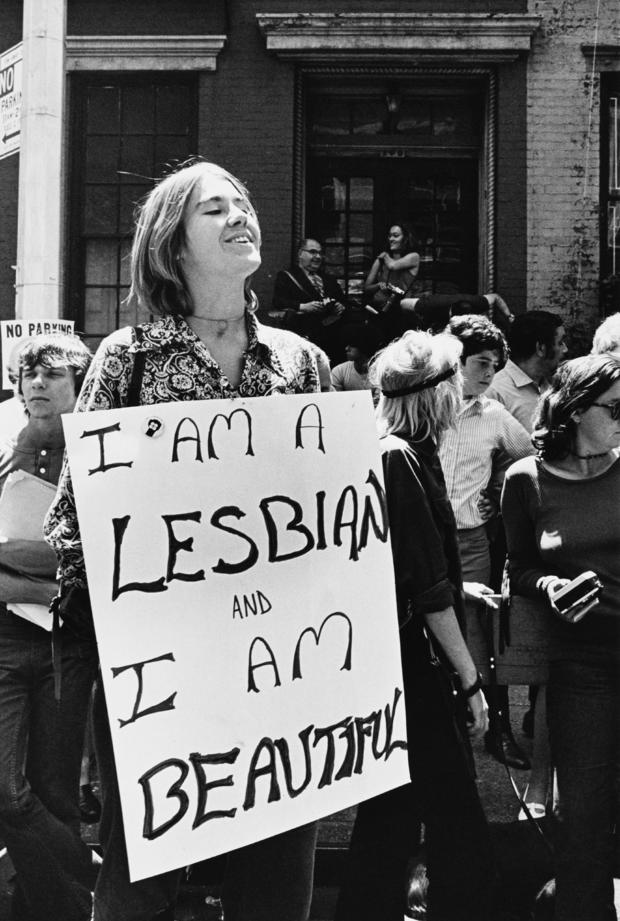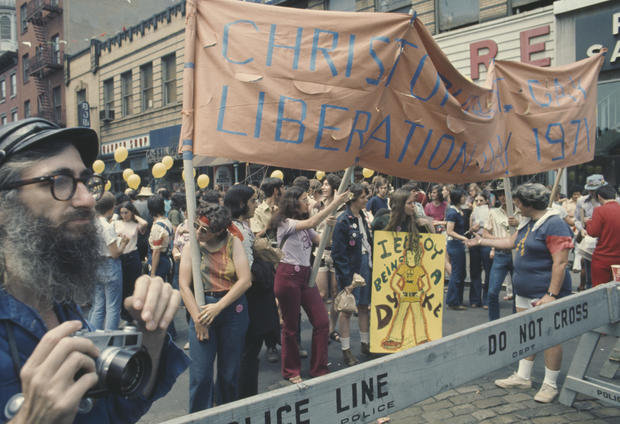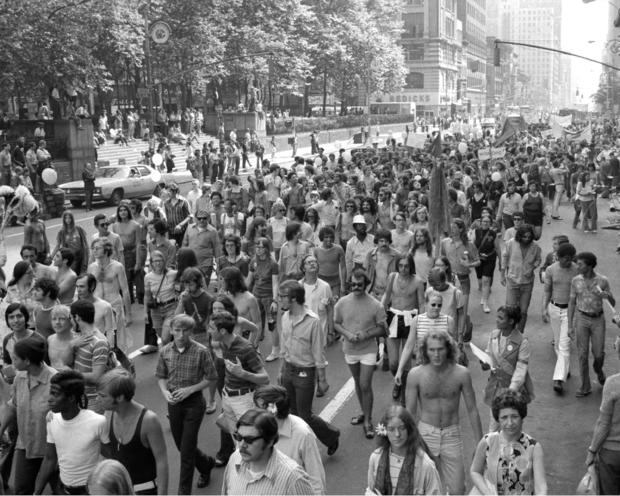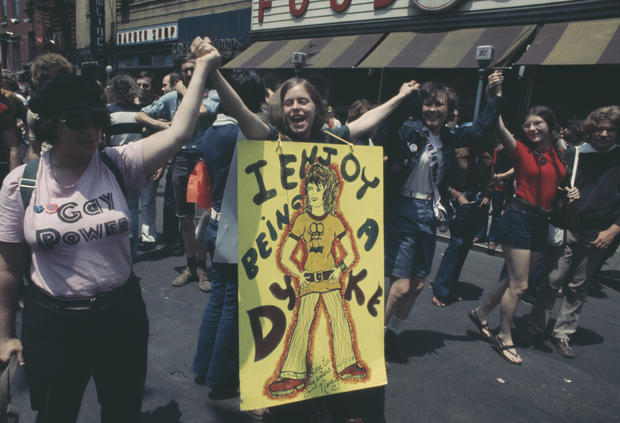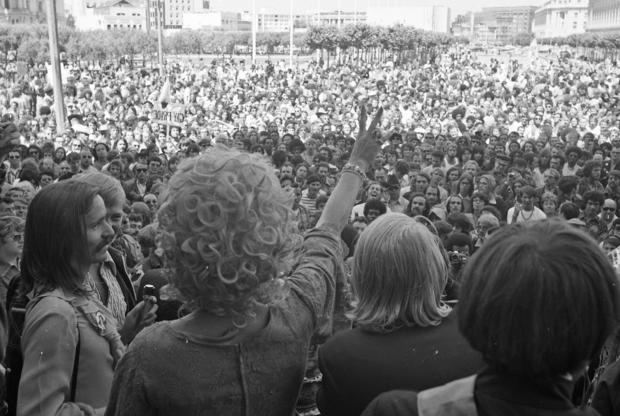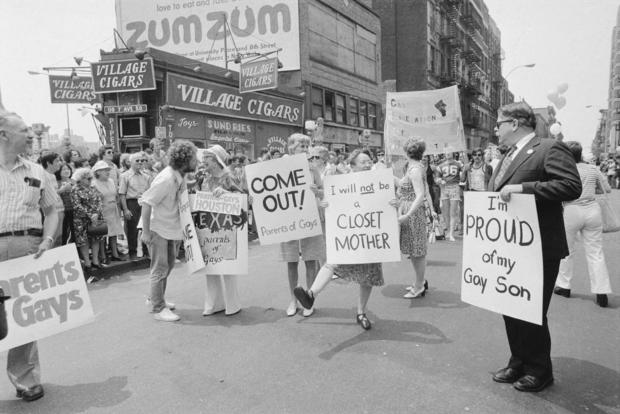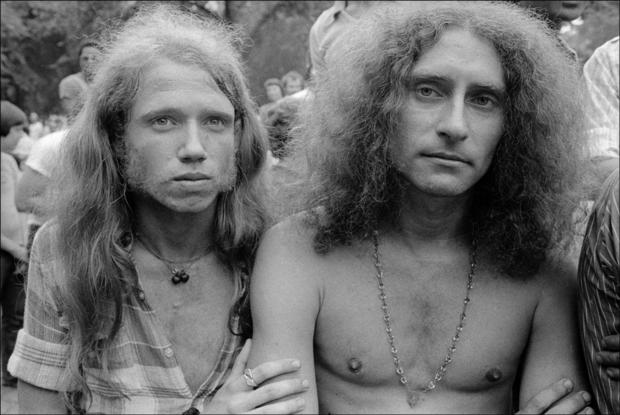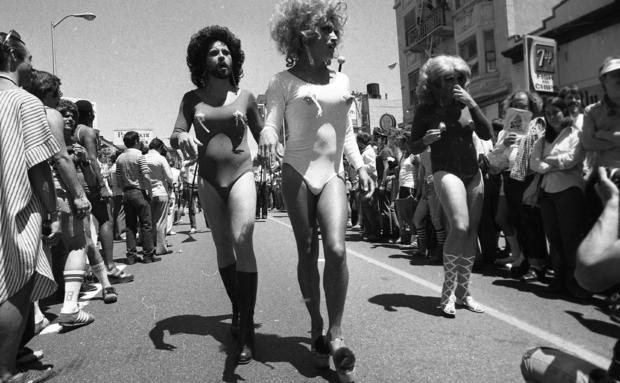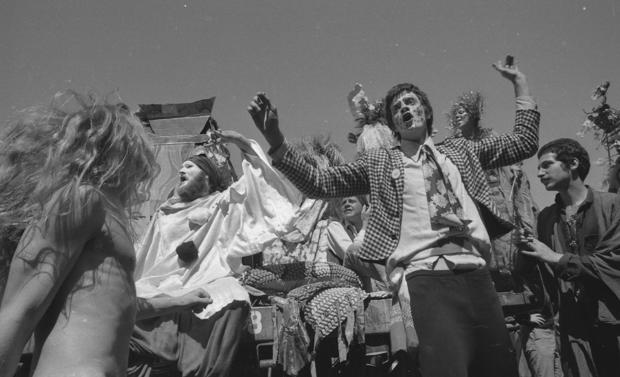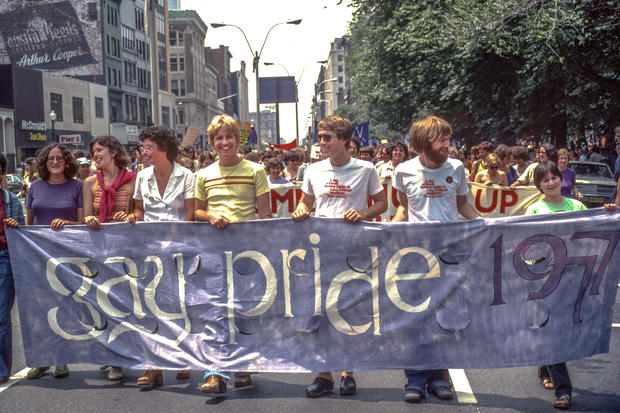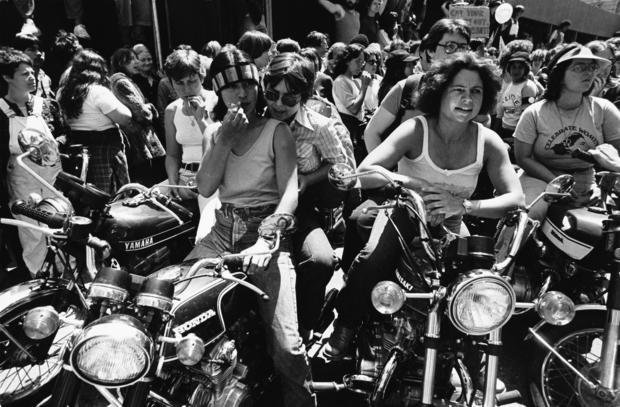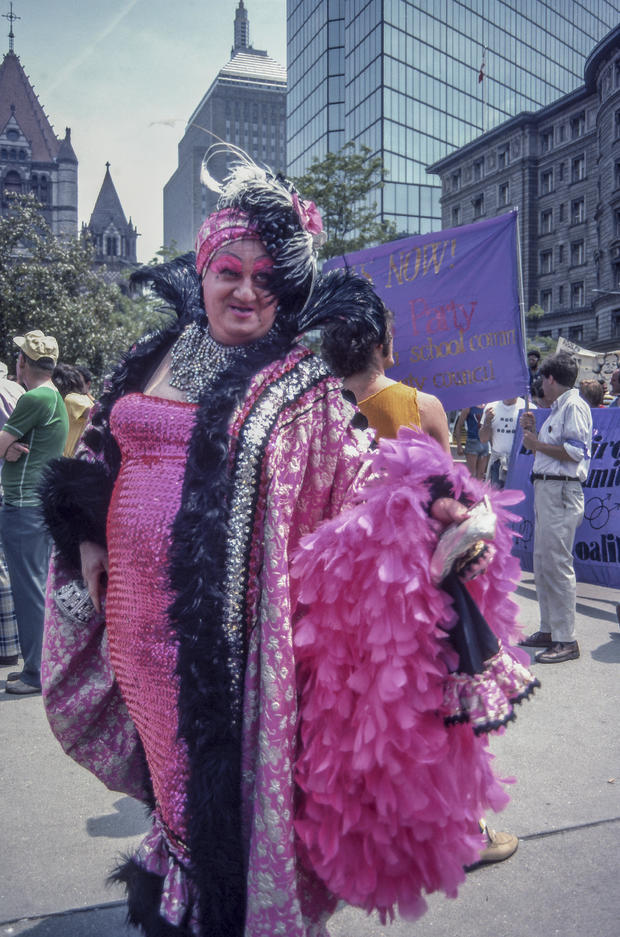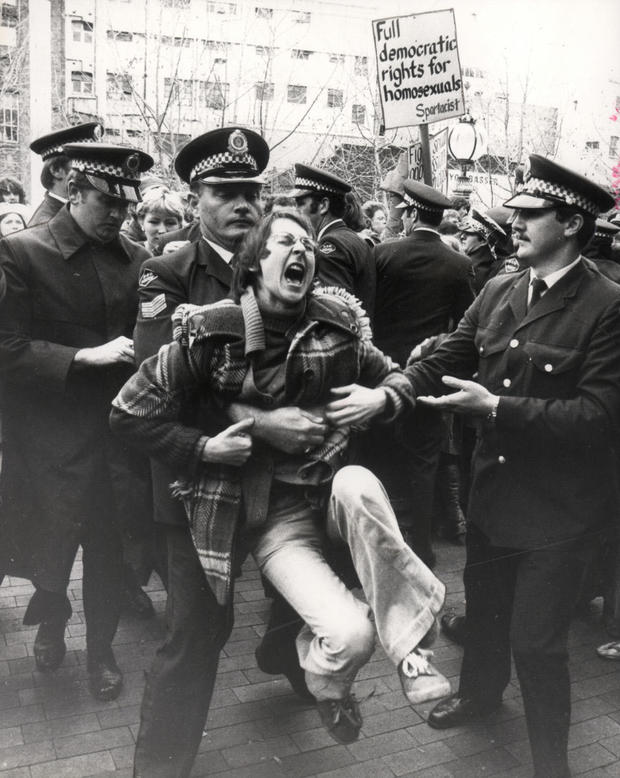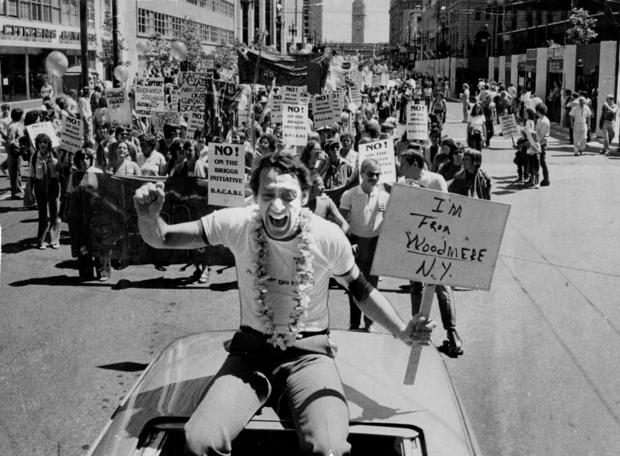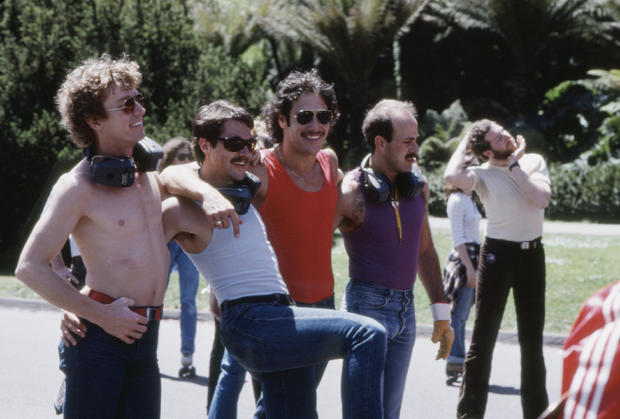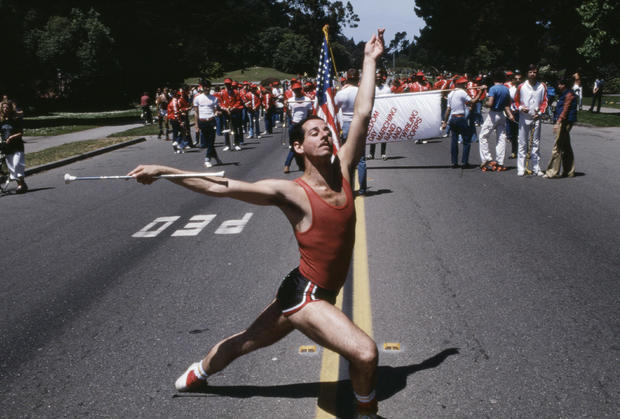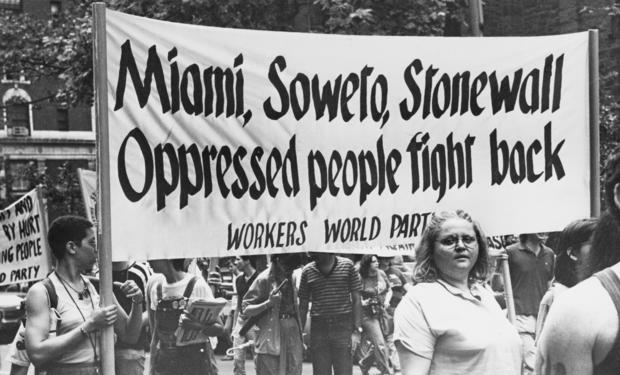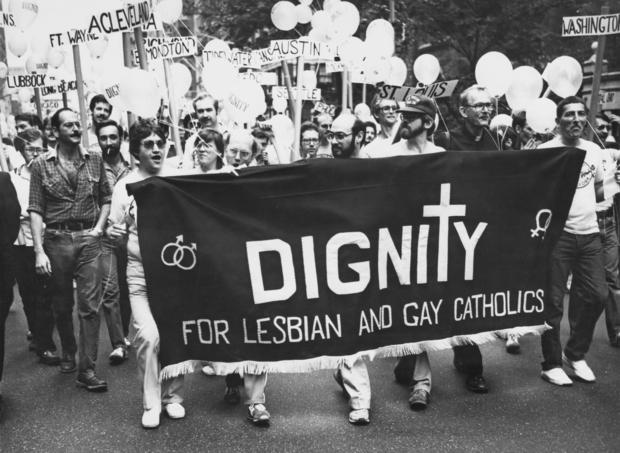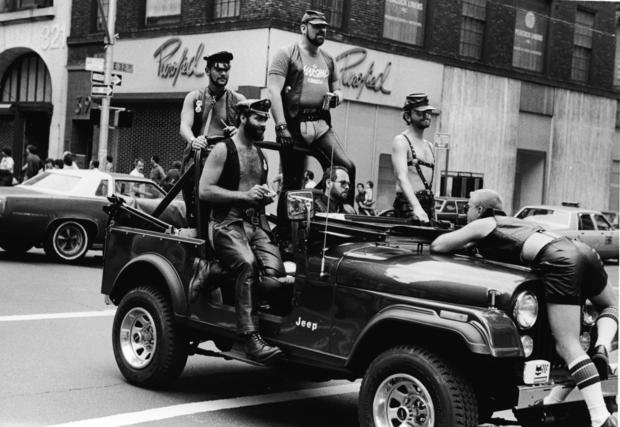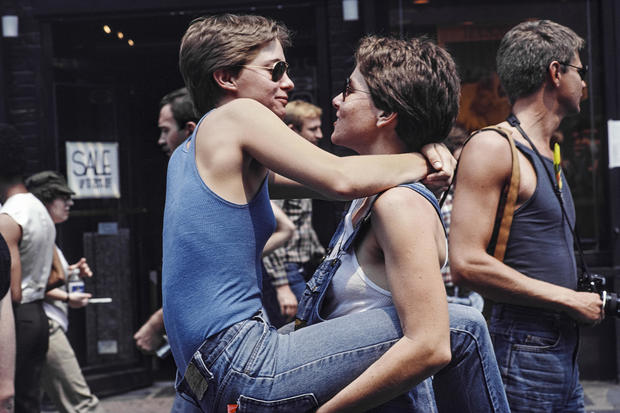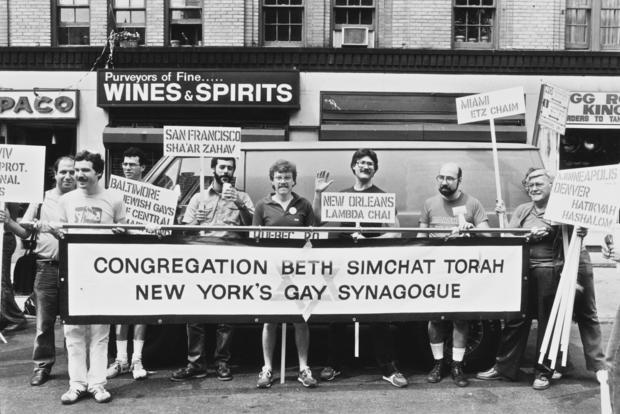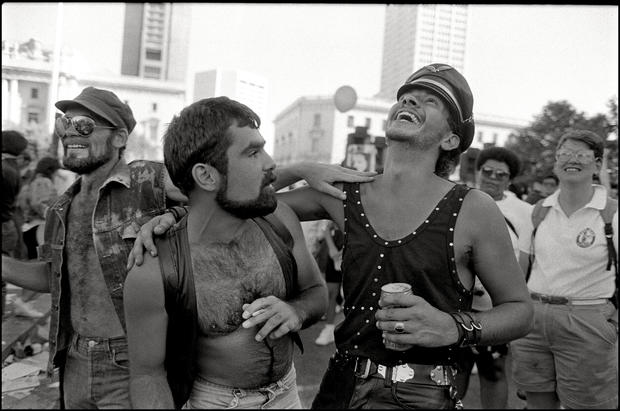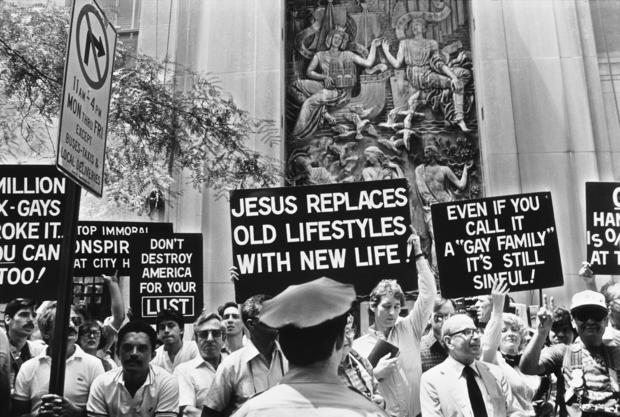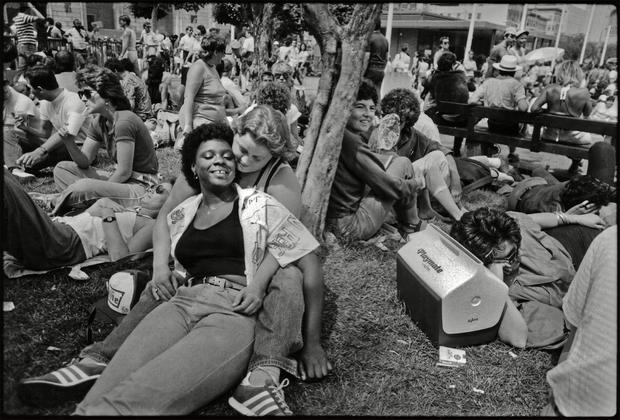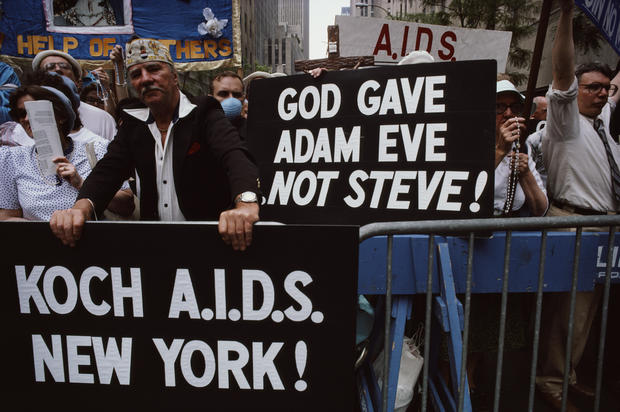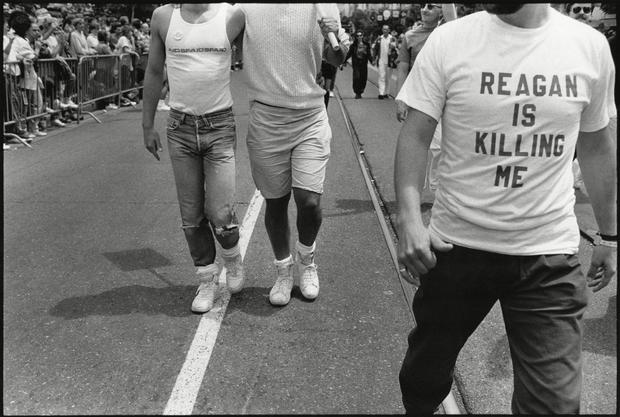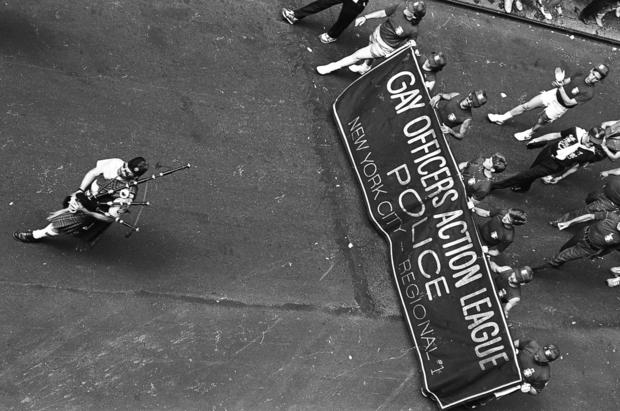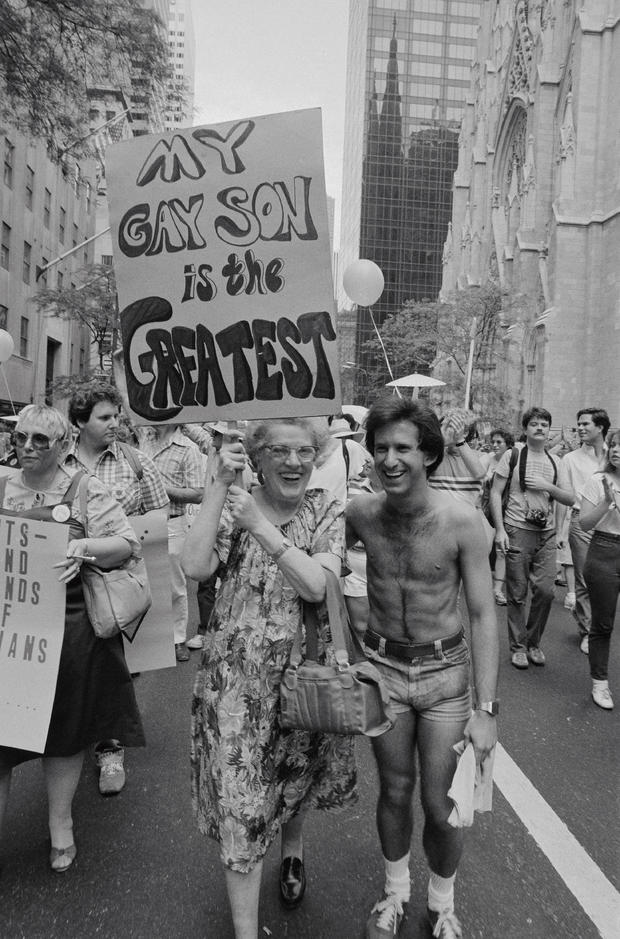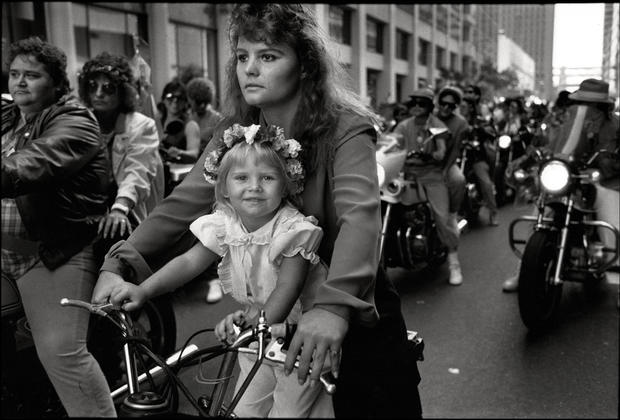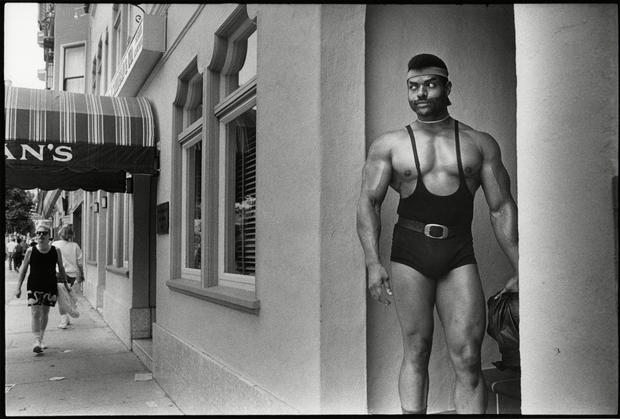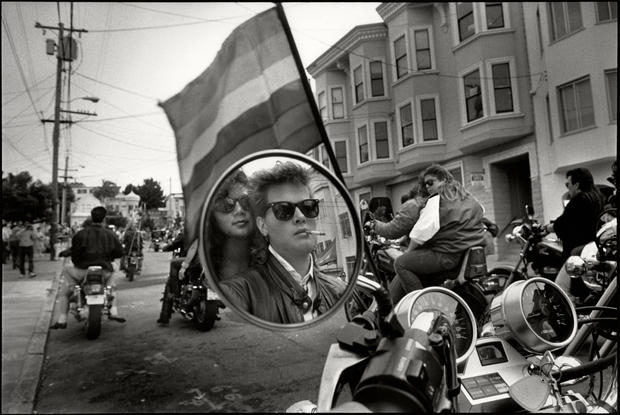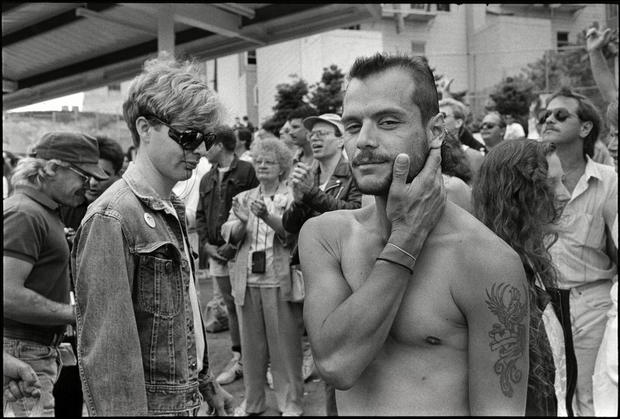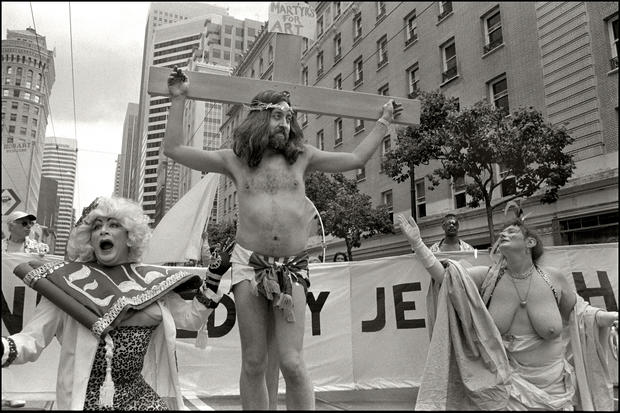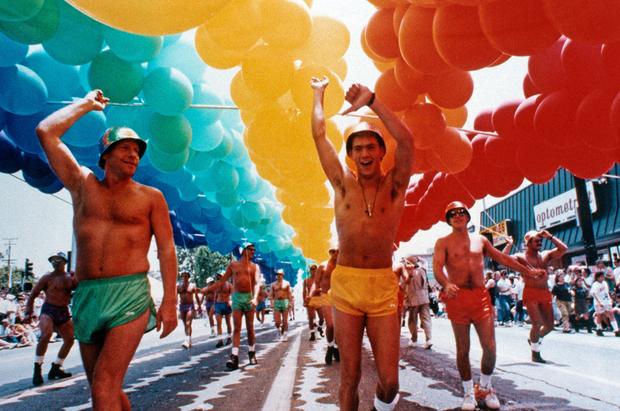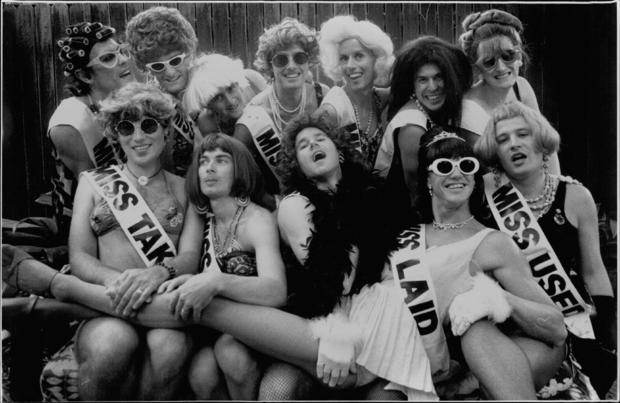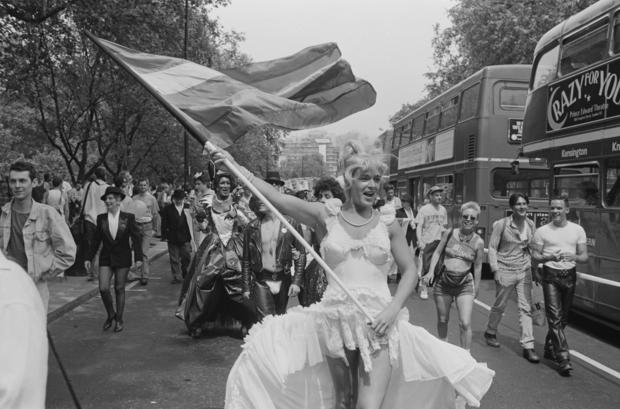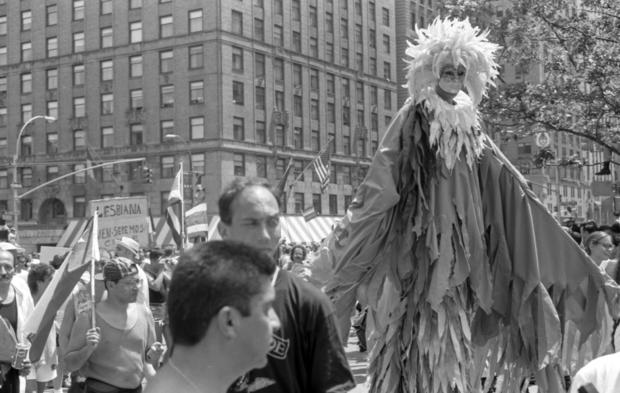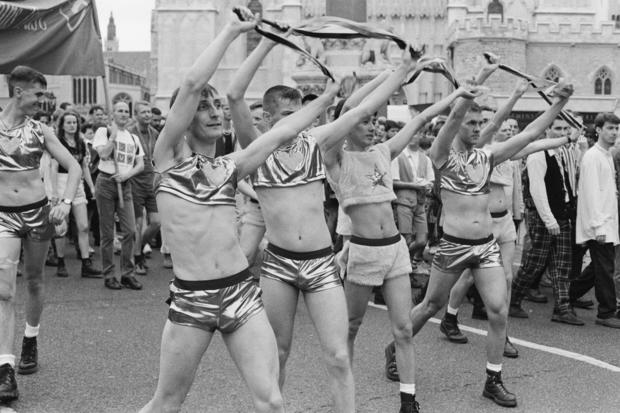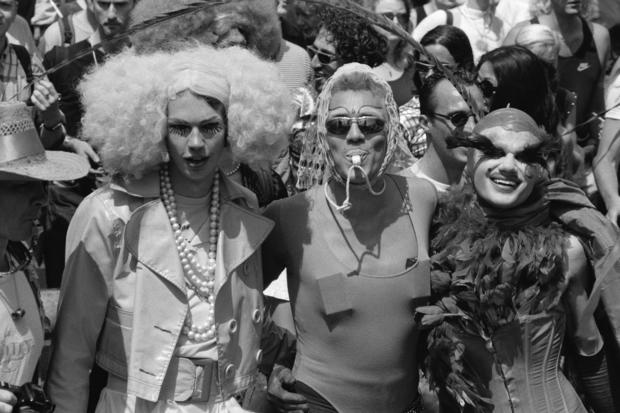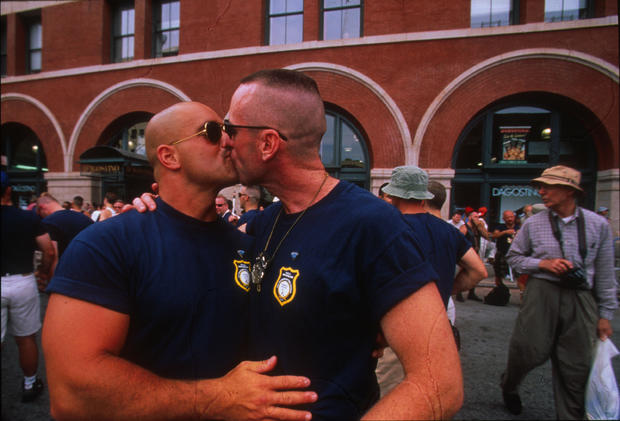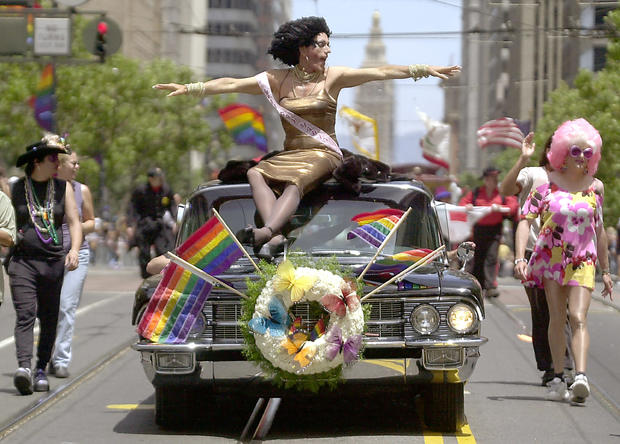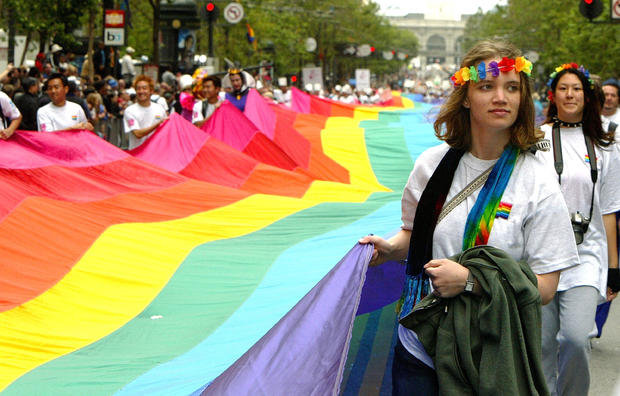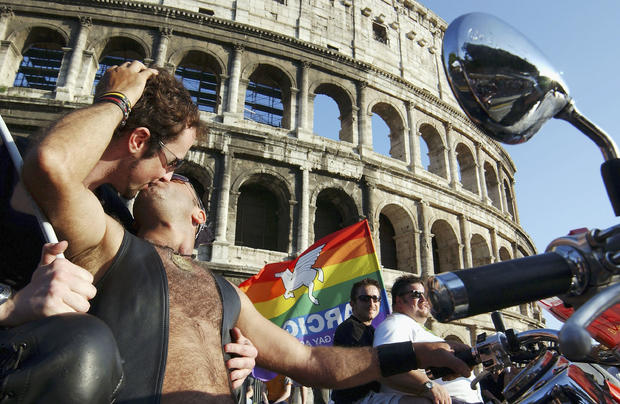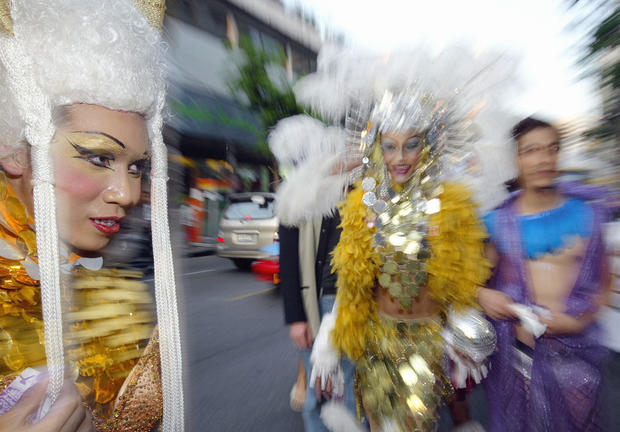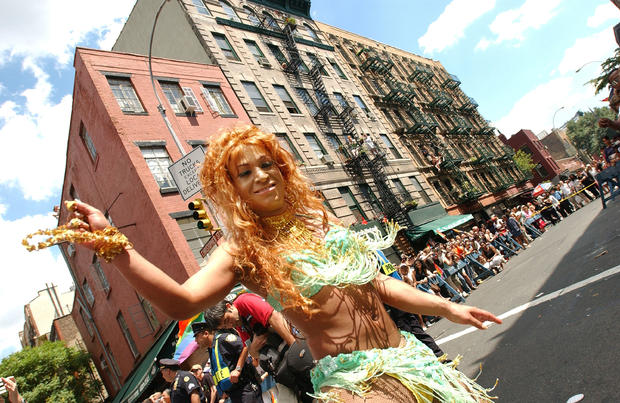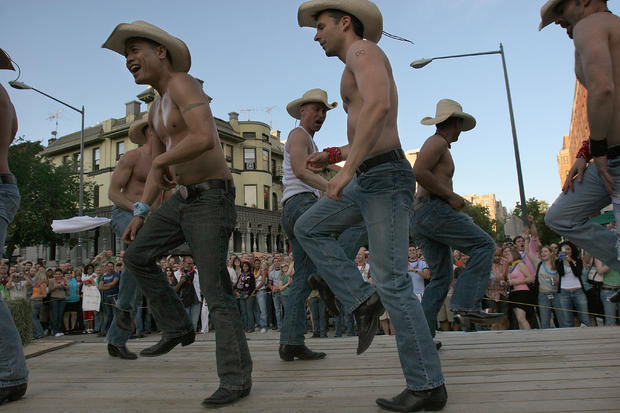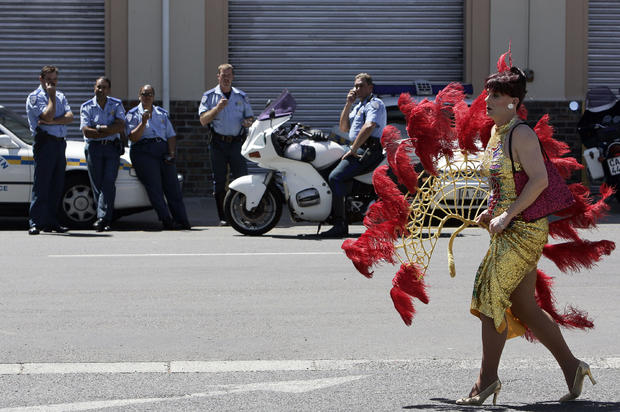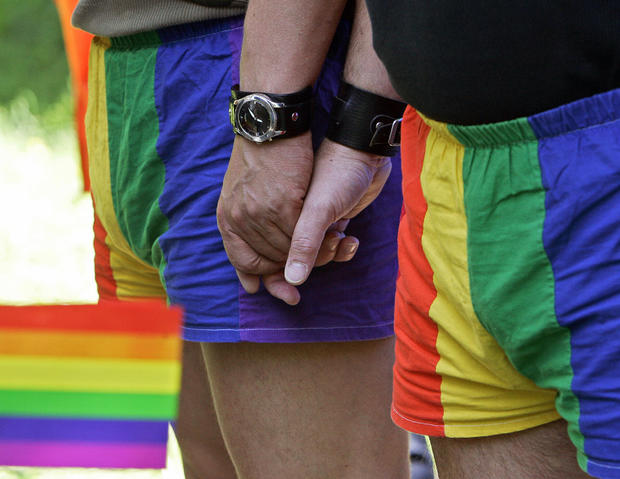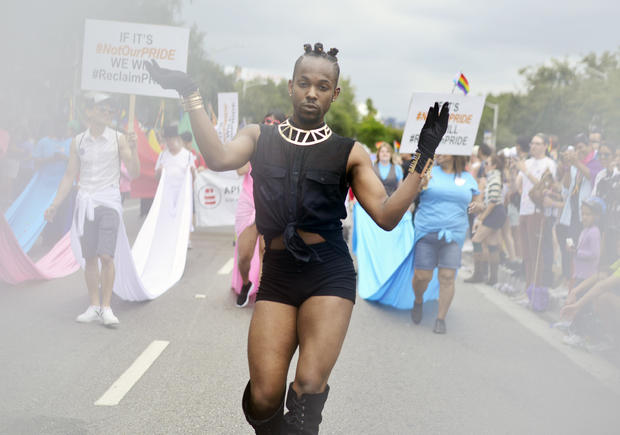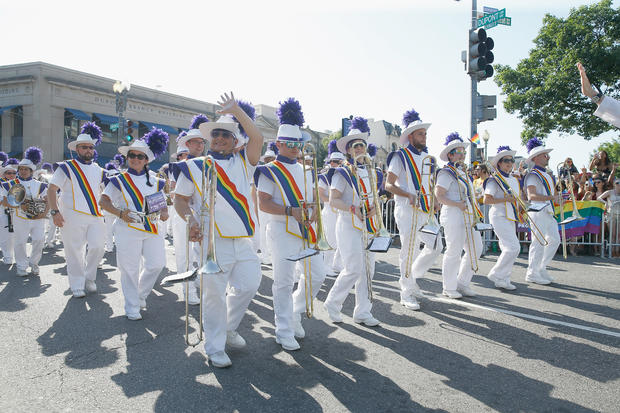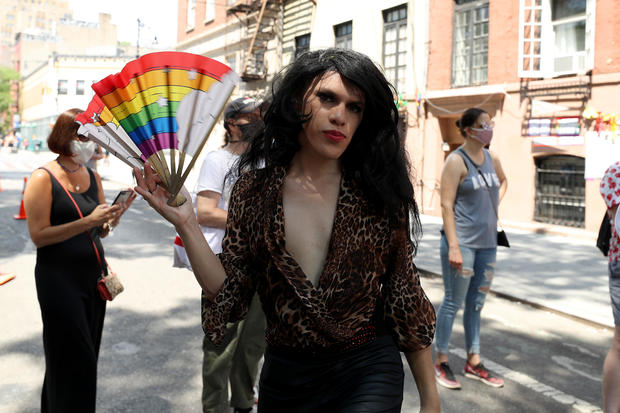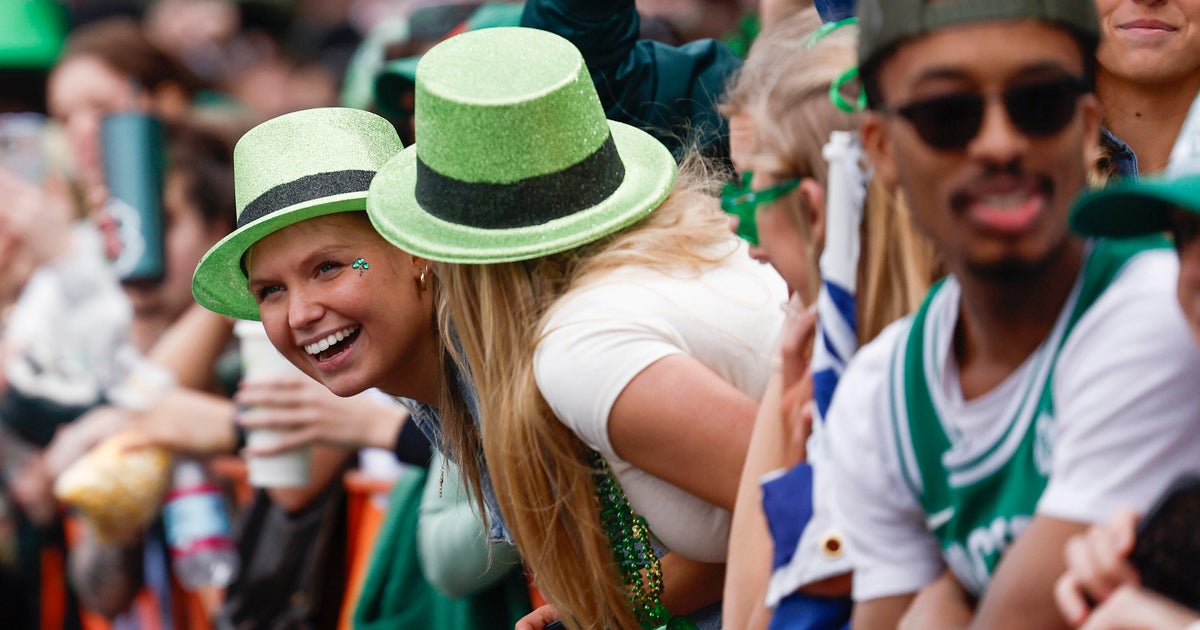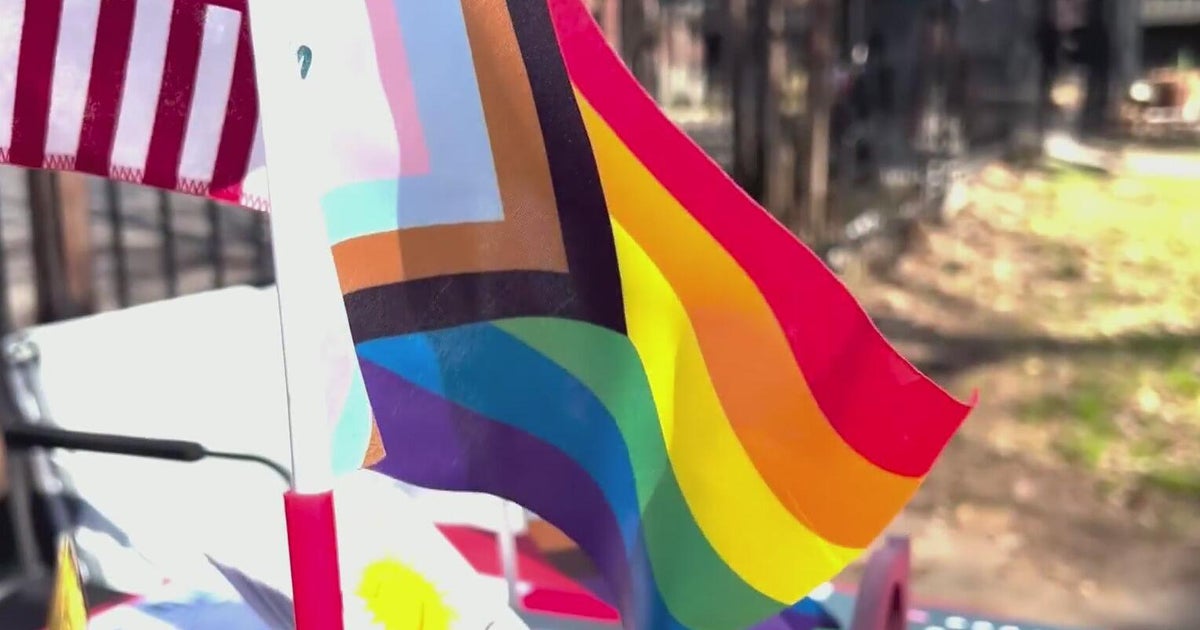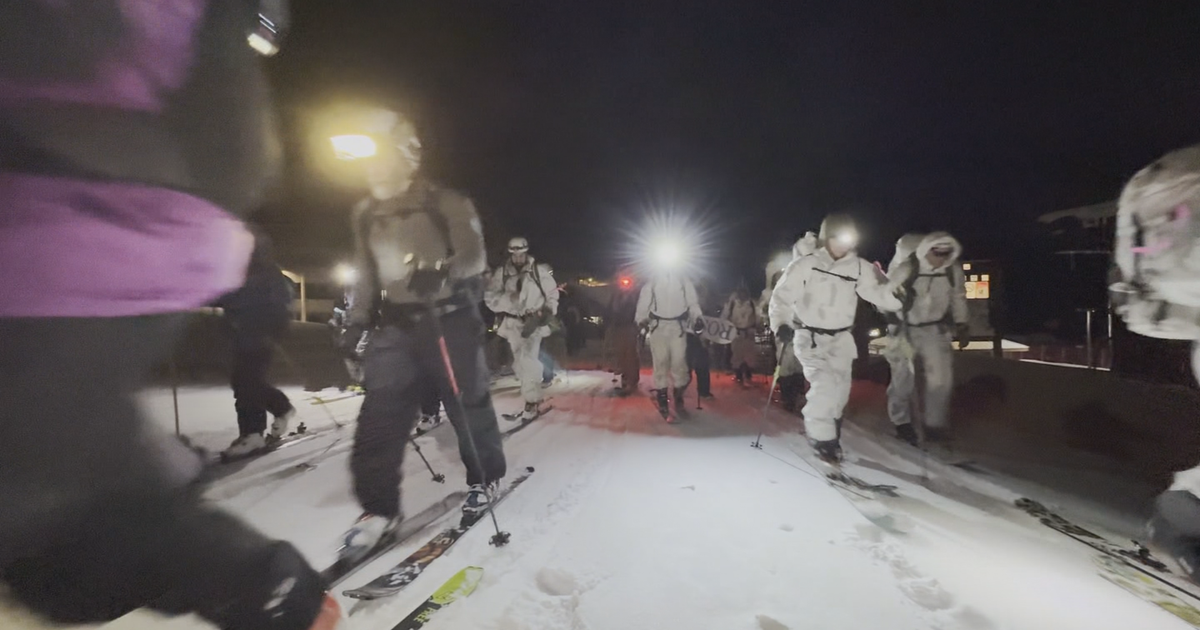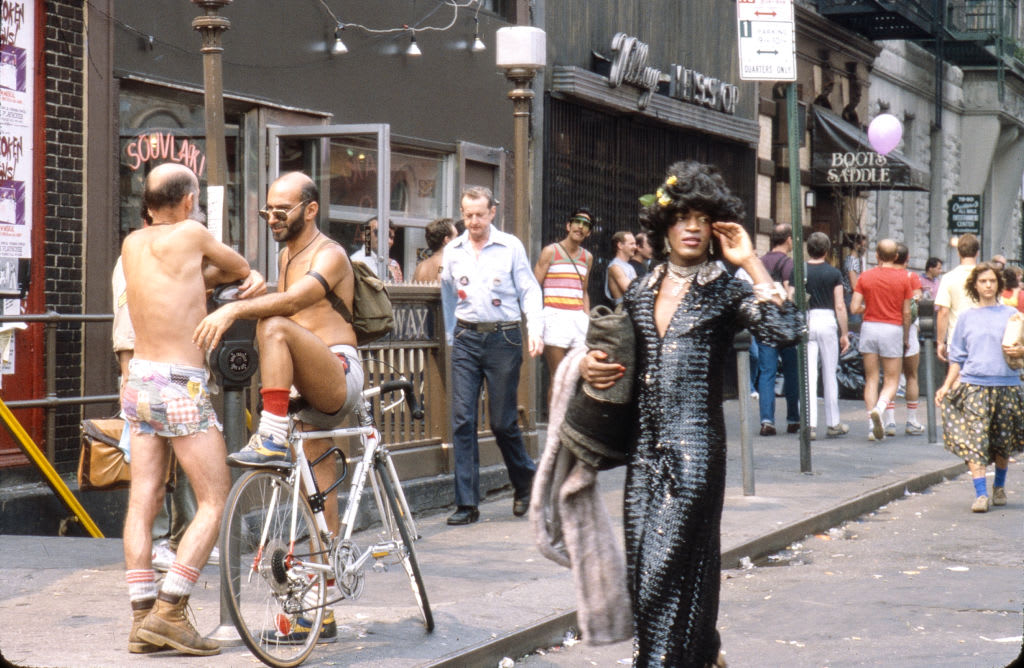50-plus years of LGBT Pride parades
On June 28, 1969, members of New York City's gay community rose up against oppression and state-sponsored violence, fighting back in an event now known as the Stonewall Riots or Stonewall Rebellion.
Within a few years, organized, annual parades of pride and remembrance would emerge to mark the event. These June pride parades have spread worldwide, evolving to address new challenges while remembering gay civil rights pioneers. Here's a look at just over 50 years of pride parades, both here and abroad, and how they've grown and changed.
Here, an unidentified woman holds a large sign that reads, "I am a lesbian and I am beautiful," during the first Stonewall anniversary march, then known as Christopher Street Liberation Day, in New York, on June 28, 1970.
Protesting oppression
Pride parades have always tackled multiple goals, ongoing anti-gay bigotry among them.
Here, gay activists protest discrimination at the Christopher Street Gay Liberation Day in June 1971 in New York City.
Toeing a line
Tensions with police were a major factor in the original Stonewall uprising.
Here, the LGBT parade through New York City on Christopher Street Gay Liberation Day reaches a police line in 1971.
Gay Pride
By its second anniversary, the Gay Pride Parade had become one of the biggest processions in New York City.
Here's a look at the second-annual New York gathering in Manhattan.
A new take
In 1958, Rogers and Hammerstein debuted Flower Drum Song, a Broadway musical featuring the camp-ready tune, "I Enjoy Being A Girl."
Here, a woman holds a placard during the 1971 New York parade.
Meanwhile, west of the Rockies...
Meanwhile, gay activists were organizing in San Francisco and beyond.
An estimated 3,000 people marched down Polk Street during "Christopher Street West," the first organized San Francisco Gay Parade, on June 25, 1972.
Pre-PFLAG
Pride parades also have served as early points of emergence for allies and support groups. Here, parents march in support of LGBTQ rights in June 1974 in Greenwich Village, New York City.
On the right is American lawyer Dick Ashworth, marching with a sign that reads "I'm proud of my gay son." He later became one of the founding members of PFLAG — Parents, Families, and Friends of Lesbians and Gays.
1970s activism
Pride parades continued to grow in size and popularity in the 1970s.
Here, a long-haired couple poses in Central Park after a gay pride parade in New York on June 29, 1975.
The spirit of '76
Here's what the San Francisco pride parade looked like during America's bicentennial year.
Drag queens pose at the "Gay Freedom Day Parade" on June 27, 1976.
Eight years strong
By 1977, West Hollywood's Christopher Street West Association was 8 years old.
Meanwhile, here's a look at San Francisco's 1977 Gay Pride Parade.
Pride on Commonwealth Avenue
By the mid-1970s, pride parades were no longer limited to New York and California.
Here's a view of the 1977 gay pride parade on Commonwealth Avenue in Boston, Massachusetts.
Riding for freedom
Women were a key part of pride events from the very beginning.
Here, members of the Women's Motorcycle Contingent get ready to ride at the San Francisco Gay Freedom Day on June 26, 1977.
Challenging gender roles
Pride parades often serve as a way for gay people to safety express themselves in public spaces.
Here, a marcher described as a female impersonator poses at a gay pride parade in Copley Square, Boston, Massachusetts, in 1978.
Not always harmonious
Not all early gay-rights marches were supported by police.
Here, police arrest a protester during a gay rights demonstration, which would become known as the first Sydney Gay and Lesbian Mardi Gras, in June 1978.
The times of Harvey Milk
In 1972, amid a large migration of gay men, a budding leader named Harvey Milk moved from New York City to the Castro District of San Francisco, where he would later become the first openly gay elected official in California.
Here, Harvey Milk appears at a Gay Pride Parade in 1978.
Speaking to media
Here, gay activists at a San Francisco pride parade appear in a still from the ABC series "ABC News Closeup."
The title of the 1979 episode: "Homosexuals."
Posing proudly
By 1979, mainstream media was regularly covering pride parades.
A marcher appears on the ABC series "ABC News Closeup" episode "Homosexuals."
A new decade
Gay pride parades aren't just about gay pride.
Here, activists of the Workers World Party hold a banner reading, "Miami, Soweto, Stonewall, oppressed people to fight back." The place: The annual Pride Parade in the New York City, June 1980.
Church activism
Pride parades often allow diverse groups to come forward and seek equality.
Here, a group of lesbian and gay Catholic activists hold a banner at the annual Pride Parade in New York City in June 1980.
Leathermen
Men dressed in leather fetish clothing ride in a truck at the intersection of 32nd Street and Fifth Avenue.
The setting: The annual Gay Pride parade in New York City, circa 1980.
Gay Pride '82
By the 1980s, pride parades had popped up in Mexico City, Montreal and London.
Here, two women embrace during the Gay Pride parade in New York City in June 1982.
Jewish pride
Members of the Jewish community join Gay Pride Day in New York City in June 1982.
This congregation, founded in 1973 and now known as Beit Simchat Torah, still exists today.
Arm in arm
Three men, arm in arm, smile outside the San Francisco Civic Center during the International Lesbian & Gay Freedom Day Parade.
The year: 1987.
Hate response
Counterprotesters and hate messages have long accompanied pride parades.
Here, protesters show their disapproval at a Gay Pride parade in New York in June 1983.
Early AIDS activism
Two years after the first news story about AIDS appeared in a New York publication, gay activists are seen taking their fight against the disease to the streets.
Here's a view of the 1983 parade in New York City.
Smiling couple
Among a crowd on the grass outside the Civic Center in San Francisco, two women share a smile.
The event: The 1984 International Lesbian & Gay Freedom Day Parade.
Homophobia
A homophobic demonstration is seen on Fifth Avenue during Gay Pride Day in New York in June 1985.
The protesters hold placards equating the current mayor with the AIDS crisis.
"Reagan is killing me"
Marchers appear on Market Street in the International Lesbian & Gay Freedom Day Parade in San Francisco, California on June 28, 1987.
At the time, president Ronald Reagan was under criticism for a slow response to the AIDS crisis.
Pride in blue
As seen from above, marchers, including a bagpipe player, display a Police Gay Officers Action League banner on Christopher Street.
The event: The annual New York City Pride March in New York on June 30, 1985.
"The greatest"
A woman makes her point of view known as she passes New York City's St. Patrick's Cathedral (right), during the 14th annual Lesbian and Gay Pride Parade.
More than 100,000 marched that year.
Jennifer and mom
A young girl identified only as Jennifer rides in front of her mother among the Dykes on Bikes group, established in 1976.
The event: The International Lesbian & Gay Freedom Day Parade, San Francisco, June 15, 1985.
Pierre
A man identified only as Pierre stands in a doorway on Market Street during the International Lesbian & Gay Freedom Day Parade in San Francisco.
The year: 1987.
"Dykes On Bikes" 1988
Their faces reflected in the motorcycle mirror under a Pride flag, a pair of women in the Dykes on Bikes group wait in the Castro District for the start of the International Lesbian & Gay Freedom Day Parade, in San Francisco, on June 26, 1988.
Now known as the San Francisco Dykes on Bikes Women's Motorcycle Contingent, the group supports charities in the LGBT community.
In the shadow of the 1990s
A shirtless man poses in a crowd on Market Street during the International Lesbian & Gay Freedom Day Parade in San Francisco in 1989.
Today, parade organizers say the annual San Francisco event is the largest gathering of its kind in the nation.
Remembering Stonewall during Pride
Traffic device worker Darryl Beckles changes the street sign on Christopher Street in Greenwich Village in Manhattan to Christopher Street/Stonewall Place on June 6, 1989.
The sign commemorated the 20th anniversary of the Stonewall riots.
Artist Gilbert Baker
American textile artist and gay rights activist Gilbert Baker (1951-2017) seen here costumed as Jesus, carries a cross as he marches with others on Market Street during the International Lesbian & Gay Freedom Day Parade in San Francisco, California, on June 24, 1990.
Baker was the designer (in 1978) of the original rainbow flag, or pride flag, which came to be associated with LGBTQ+ groups all over the world.
Full color
Men march in the Gay Pride Parade on June 1, 1991 in West Hollywood, California.
In 2021, Los Angeles-area pride events were canceled because of the coronavirus pandemic.
Beauty queens
A group called the Beauty Queens poses, dressed up for a pride parade in 1950s-style bathing costumes.
Ms. Pastel, in a red glittering body suit, would lead the group in the Sydney Gay and Lesbian Mardi Gras on February 27, 1993.
RuPaul in the '90s
Performer RuPaul attends the Gay and Lesbian Pride Parade on June 12, 1994 at Santa Monica Boulevard in West Hollywood, California.
The TV personality now hosts "RuPaul's Drag Race."
Channeling Marilyn
A marcher dressed as Marilyn Monroe waves a rainbow flag at the Lesbian and Gay Pride event in London in July 1994.
The first UK pride rally was held in 1972.
"Stonewall 25"
A gay rights activist wearing an elaborate costume, mask, and headdress walks on stilts beside other activists during the New York Gay Pride March, in 1994.
The march commemorated the 25th anniversary of the Stonewall Riots.
London '95
Marchers at a Lesbian and Gay Pride event pose outside Westminster Abbey in London on June 24, 1995.
By the 1990s, this particular event had grown more party-like, with a fair after the marches.
Fighting AIDS
A tank at the 1995 Gay Pride march in London carries the "Gay Men Fighting AIDS."
In the decades that followed, more Pride events would emerge during that commemorative month of June, including the Big Gay Out music festival.
Pride in costume
Three marchers pose at the 1996 Gay Pride Parade in London. By the 2000s, London Pride events would attract millions of people.
Pride in Paris
Here's a gay pride event in Paris.
The year: 1996.
Approaching a new millennium
Two men kiss during the Gay Pride Parade on June 27, 1999 in New York.
By the 2000s, this parade, like the event in London, would attract millions of gay people and their allies.
Miss Gay Marin
Miss Gay Marin rides on the roof of a Cadillac during the 31st annual San Francisco Gay Pride Parade.
The year: 2001.
International pride
Members of the Salvadoran gay community wear costumes at a pride parade in 2003 in San Salvador, El Salvador.
Current-day Salvadoran pride parades attract tens of thousands.
One long flag
Participants in the 2003 Lesbian Gay Bisexual Transgender Parade display a half-mile-long rainbow flag on June 29, 2003 in San Francisco.
Thousands of spectators lined Market Street to watch the annual parade.
Pride in Rome
A gay couple kiss on a motorcycle in front of the Colosseum during the 10th Gay Pride Parade in Rome, on July 3, 2004.
That year's parade was part of a World Pride Week, and attracted thousands of marchers fighting for gay rights.
Pride in Thailand
Thai marchers appear in an annual pride parade on Silom Road in downtown Bangkok.
The year: 2004.
Back to New York
A marcher dances during the annual Gay Pride parade on June 27, 2004 in New York City.
Thousands lined the streets of New York to see the annual parade, which, that year, focused on gay marriages.
Marching in step
Marchers representing the DC Saloon Cowboys perform a line dance during the 31st Annual Capital Pride Parade on Saturday, June 10, 2006.
The place: Washington, D.C.,
Progress in Africa
A drag queen passes in front of Cape Town policemen ahead of the Gay Pride 2007 Parade in Cape Town.
South Africa became one the few countries in the world to legalize same-sex marriage at the end of 2006.
Eastern European pride
Participants of the Gay Pride attend a march in a closed park in the center of Riga, Latvia, on June 3, 2007.
Several hundred Latvian gay and lesbian marchers staged the country's third Gay Pride rally under tight security aimed at preventing protests that marred previous events.
Pride in 2016
Participants pose during LA Pride Music Festival and Parade 2016 in West Hollywood, California.
2020 events were canceled due to coronavirus.
Looking smart
Parade participants are seen during the 2017 Capital Pride Parade on June 10, 2017 in Washington, DC.
The first such event was held in 1975.
A major anniversary
People celebrate as they take part in a muted 50th anniversary celebration of the first Pride march on June 28, 2020 in New York City, in the midst of the COVID-19 pandemic.
The previous year, the event drew an estimated crowd of 4 million.
